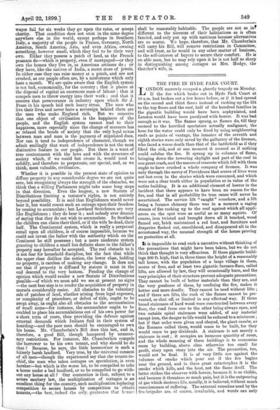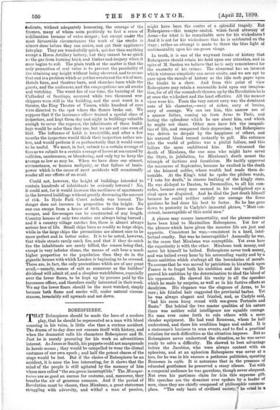THE FIRE DT HYDE PARK COURT. T ONDON narrowly escaped a
ghastly tragedy on Monday. A If the fire which broke out in Hyde Park Court at 10 a.m. had broken out a few hours before, or if it had spread on the second and third floors instead of rushing up the lift to the top floors and the roof, half of the hundred families in the gigantic building would have been asphyxiated, and London would have been paralysed with horror. It was bad enough as it was. The flames sprang, as flames do, till they seemed to the horrified spectators actually malignant, the hose for the water could only be fixed by using neighbouring roofs as points of vantage, the inmates of the seventh and eighth stories were only saved by the gallantry of the firemen, who faced a worse death than that of the battlefield as if they liked the risk, and at one moment it seemed as if nothing could subdue the fire. It sprang up in columns of flame, bringing down the towering skylight and part of the roof in one great crash, and the masses of concrete which fell with them ought to have crashed a whole company of firemen. It was only through the mercy of Providence that scores of lives were not lost even in the stories which were consumed, and which were not a clear tenth either in population or in value of the entire building. It is an additional element of horror in the incident that there appears to have been no reason for the fire, and that in all piobability its true cause will never be ascertained. The service lift " caught " somehow, and a lift being a furnace chimney there was in a moment a raging stream of fire rushing up to the roof against which all appli- ances on the spot were as useful as so many squirts. Of course, iron twisted and brought down all it touched, wood flamed out, brick maintained a red heat, and furniture and draperies flashed out, smouldered, and disappeared all in the accustomed way, the unusual strength of the house proving no protection at all.
It is impossible to read such a narrative without thinking of the precautions that might have been taken, but we do not think that thought is very efficacious. If these gigantic build- ings 200 ft; high, that is, three times the height of a reasonably tall house, with the population of a large village in them, scores of fires, and at least two gigantic furnace-flues, called lifts, are allowed by law, they will occasionally burn, and the very principles of their structure prevent adequate precautions.. They cannot be built of better materials than they are, and the very goodness of these, by confining the fire, makes it hotter and more deadly. They cannot be used without lifts ; and if there are lifts, the rush of the flames cannot be pre- vented, or shut off, or limited in any effectual way. If three broad staircases of hard wood were constructed between every floor, the road from one to the other being always open, and two outside spiral staircases were added, of any material except iron, the danger to life would be reduced to a minimum ; but if that order were given and obeyed, the giant insulce, as the Romans called them, would cease to be built, for they would cease to pay dividends. A staircase is not merely a staircase in cost ;. it occupies an immense quantity of room, and the whole meaning of these buildings is to economise room by building, above sites otherwise too small for profit, story upon story into the air. The precaution, too, would not be final. It is of very little use against the 'volumes of smoke which pour out if the fire begins near the ground, and in these great catastrophes it is the smoke' which kills, and the heat, not the flame itself. The latter strikes'the observer with horror, because it is so visible, and because it threatens so much pain, but it is the outpouring of gas which destroys life, usually, it is believed, without much consciousness of suffering. . The external remedies used by the fire-brigades are, Of course, invaluable, and words can only indicate, without adequately honouring, the courage of the firemen, many of whom seem positively to feel a sense of exhilaration because of extra danger ; but except under the most favourable circumstances the work of the smoke is almost done before they can arrive, and get their appliances into play. They are wonderfully quick, quicker than anything except a Horse Artillery battery, but they cannot be as quick as the gas from burning brick and timber and drapery when it once begins to roll. The plain truth of the matter is that the only precaution of real value is to prevent the possibility of fire attaining any height without being observed, and to secure that end is a problem which as yet has overtaxed the wit of man. Hotels burn, and theatres burn, and churches burn while the guests, and the audiences, and the congregations are all awake and watching. The worst fire of our time, the burning of the Cathedral of Santiago, occurred while two thousand wor- shippers were still in the building, and the next worst in a theatre, the Ring Theatre of Vienna, while hundred of eyes were directed to the spot where the flames broke out. We suppose that if the insurance offices trained a special class of inspectors, and kept them day and night in buildings valuable enongh to cover the expense, the inhabitants of those build- ings would be safer than they are, but we are not sure even of that. The influence of habit is irresistible, and after a few months the inspectors would think their inspection rather use- less, and would perform it so perfunctorily that it would cease to be useful. We must, in fact, submit to a certain average of fires as we submit to a certain average of losses at sea caused by tollision, carelessness, or blundering, and only try to keep the average as low as may be. When we have done our utmost, circumstance, or human malignity, or that failure of brain- power which is the cause of most accidents will occasionally render ell our efforts of no avail.
Could not, however, the height of buildings intended to contain hundreds of inhabitants be seriously lowered No, it could not, for it would increase the costliness of apartments in the lowered buildings without greatly decreasing the amount of risk. In Hyde Park Court nobody was burned. The danger does not increase in proportion to the height. No one can .escape from a. house of GO ft. unless there are fire- escapes, and fire-escapes can be constructed of any length. Country houses of only two stories are always being burned ; and if a country village catches fire, there is almost always serious lose of life. Small ships burn as readily as large ships, while in the large ships the precautions are almost sure to be more perfect and in better order. It is to be noted, however, that whole streets rarely catch fire, and that if they do catch fire the inhabitants are rarely killed, the reason being that, except in very inferior slums, the means of exit bear a much higher "proportion to the population than they do in the gigantic houses with which London is beginning to be covered. Those are, in fact, the only precautions which are of any great avail,—namely, means of exit as numerous as the builders' dividend will admit of, and a sleepless watchfulness, especially over the lower floors, to be kept up by persons paid by the insurance offices, and therefore really interested in their work. We say the lower floors should be the most watched, simply because both flame and smoke will, under natural circum- stances, invariably roll upwards and not down.







































 Previous page
Previous page